Interview - Dark Line Spectrum - 2025 (ENG)
- Xzvrey

- 25 juil. 2025
- 9 min de lecture
Dernière mise à jour : 27 juil. 2025

It is such a pleasure to highlight deserving friends who present a solid, unique, and beautifully crafted project. Talent and quality are too rarely celebrated, and Dark Line Spectrum is proof of that.
Giving these two creative souls a voice is not simply a kind gesture; it is a necessity. A project like DLS cannot remain in the shadows. On the contrary, it deserves to unfold under a dark, elegant, and subdued light, watched attentively by admiring fans who recognize the sheer amount of work required for an album of this magnitude.
Interview conducted by Xzvrey in 2025.
Propos recueillis par Xzvrey en 2025.
1/ Hi Drone and Taxidermie! How have you been? How have these past few months gone since your album’s release? Are you happy with the feedback so far?
Drone : Hey, great to see you again. Since the album’s release, everything has accelerated. We’ve been very busy between promotion, audience feedback, and preparing what’s next. The reviews have been overwhelmingly positive and the fans make us feel that we’ve hit the mark. It drives us to dig even deeper into the abyss. Foreign radios have been very receptive, with real enthusiasm for our sound and artistic approach. We especially thank Cyberland Radio (https://www.facebook.com/Cyberland.Radioshow) for supporting us in France. We hope to soon attract more interest from other French stations.

2/ We’ve known each other for a long time, and I’ve followed your journey closely, but could you please explain what Dark Line Spectrum (DLS) is for those who don’t know you? How would you define DLS’s musical style?
Taxidermie : DLS is an exploration of the depths of the human soul. It’s not just a band, it’s a black mirror. Musically, we call it Dark Industrial Electro — a fusion of EBM, industrial, and dark electronic music. But at its core, it’s raw, emotional, visceral matter.
3/ The new album is titled Stolen Memories "Reiteration." Why this clarification? Is it a reissue of previous tracks? It seemed to me there were quite a few new elements 😊. More broadly, how did the creative process go for the album?
Drone : Stolen Memory (Reiteration) because it’s not just a reissue but a reinterpretation. Some ideas have been rethought and reformulated. Yes, there are new things — sounds, textures, lyrics. The process was long and intense, almost organic. We drew from memories and raw sensations. The album is both a synthesis and a mutation.
4/ How do you organize the work within DLS? Who composes, who handles the sound? Who manages the project’s design, website, and communication?
Drone : I handle composition, sound design, production, mixing, and mastering. It’s at these stages that I can really push the sound to its limits, to the point of vertigo. I also design the laser shows for live performances, with visuals specific to each track. It’s an extension of the music into light, meant to resonate with both eyes and ears.
We also work with Dr. Ballon, our technical assistant for music and video. He has solid expertise in both areas, and his advice is always spot-on. He notices the details that matter and helps us make the right technical choices, both in sound construction and visuals. His presence gives us a precious balance between intuition and precision.
Taxidermie : I’m in charge of the visual universe: videos, imagery, stage concepts. It’s a work of reflection and distortion, where each image extends the music.
Drone : And then there’s Maître Chat. He coordinates behind the scenes. He manages logistics, additional visuals, the website, communication, relations with TuneCore, platform follow-up… He’s kind of our manager but DLS-style: discreet, precise, efficient. Nothing would flow so smoothly without him.
5/ Releasing a new album is often the chance to promote it on stage. Do you have any gigs planned? How can concert organizers contact you to book dates?
Taxidermie : We’re working on a strong live formula, with an immersive experience. We’re open to offers. For bookings, it’s best to contact us through our website.

6/ Drone, you’ve long been a true craftsman of sound, and I often work with you for the bands I’m part of*. Do you offer your skills as a sound engineer to other bands? How can someone hire you for mixing/mastering?
*[Editor’s note: Drone has done the sound for The Last Oath and Night Train To Nowhere, two of Xzvrey’s projects.]
Drone : Yes, when a project speaks to me, I offer custom mixing/mastering services. To reach me, also go through our contact page. I favor dark, demanding worlds where I can truly add my touch.
7/ Speaking of sound, I’ve always felt you were a perfectionist in how you craft an album’s sound. You really go deep into detail, which is impressive. Would you describe yourself that way? Do you also produce more "rough" things to relax sometimes?
Drone : Perfectionist, yes. I like to go all the way with a sound, with an emotion. But sometimes I make fast, instinctive productions. It helps decompress, break out of the frame.
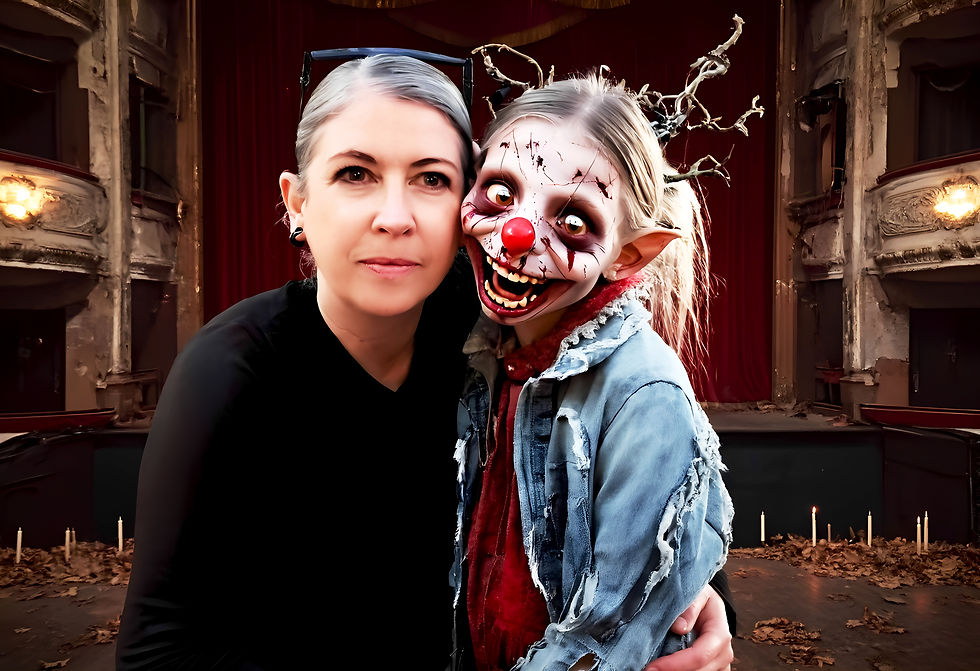
8/ Drone, also regarding music, you led the Goth-Rock project Vivid Atmosphere for years, a cult band from the Bordeaux scene. What’s the status of that project?
Drone : Vivid Atmosphere is dormant. It was another era, another language. Maybe one day I’ll reactivate that entity. For now, all my energy is in DLS.
9/ ow a question for Taxidermie. Do you also participate in creating music by recording instruments? What is (or will be) your role on stage? I understand that your live shows will include a visual dimension using VR headsets.
Taxidermie : I don’t participate directly in musical composition, but I build its setting. My role is to give form to the visual universe in which the music unfolds. In concert, I design an immersive VR set: an organic nightmare, like an extension of the sound. The audience doesn’t just watch a show — they enter a mental space, a world we’ve shaped.
It’s all amplified by the laser shows created by Drone, perfectly synchronized with each track. It enhances the sensory immersion and adds a strong visual dimension to every performance.
10/ Half-time — time to have a laugh. Do you ever argue heatedly about DLS? 😁
Drone : No, really never. It’s not how we operate.
Taxidermie : There’s a kind of silent alchemy between us. An instinctive understanding. We don’t try to convince one another, we listen, we react, we merge. It’s not constant agreement — it’s a healthy creative tension, almost telepathic.
Drone : In DLS, every potential conflict becomes a texture, a rhythm, an image. What could have been a clash becomes an artwork. And honestly… we’re too busy exploring the abyss to waste energy on arguments.
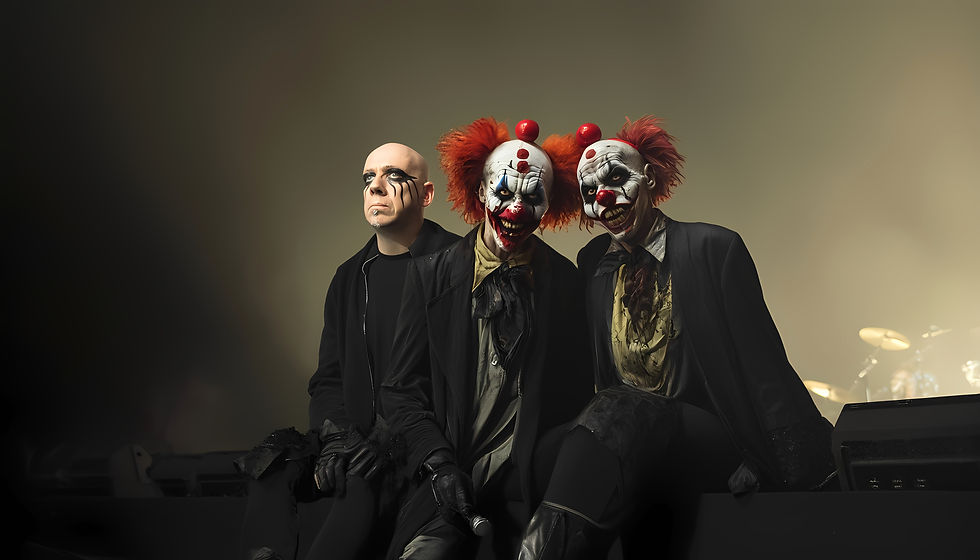
11/ To keep things light: could you explain the origins of your respective pseudonyms and what they mean to you?
Drone : It’s a pseudonym I’ve carried for a long time, since the days I was part of Techny-Call X. It was chosen in direct reference to industrial music, for its cold and mechanical sound, and for what it evokes: something continuous, inexorable. A hum that vibrates in the walls, in the bones. Drone is the invisible presence, the constant echo.
Taxidermie : It’s also a pseudonym I’ve carried for many years, long before DLS. It holds memories and a certain dark poetry, like the name of a beloved lost pet. It became a discreet tribute, an intimate link. The word itself also evokes frozen memory, beauty fixed in time, the paradox of the living immobile. It perfectly fits what I try to convey visually.s
12/ We can’t avoid this key question: what are your musical influences, or at least your reference albums and bands?
Drone : My world was built in the 80s, from the moment I first heard Joy Division. It was an immense emotional shock, a revelation. That music opened a breach, a passage toward dark worlds that I wanted to explore ever further. Then came Front Line Assembly, Neubauten, Skinny Puppy, Nine Inch Nails…
Taxidermie : I had the privilege of being immersed very (too) early in auteur cinema and dark films. Very young I discovered The Haunting (1964), A Clockwork Orange, Eraserhead, the films of Dario Argento, and those of Jean Cocteau. It shaped how I see image, movement, suggestion.

13/ What is your view on the gothic scene (in the broad sense) today? Having experienced this world in the 90s, do you think things have changed? In what way?
Drone : It’s alive, thriving. What strikes me is how it has evolved, adapted. In the 90s, the gothic scene was very codified, almost ritualized. Today, influences blend more freely: industrial flirts with techno, post-punk is rediscovered, young artists unearth past sounds to inject them into new creations. We may lose some stylistic purity, but we gain freedom and expressive intensity. What matters is that obsession, pain, and turmoil are still present. Less uniform than before, more hybrid. The 90s were a foundation; today we explore other forms.
Taxidermie : What fascinates me today is how the scene increasingly embraces its fragility. There’s a reclaiming of intimacy, vulnerability, gentle madness. The themes are no longer just aesthetic or provocative, they’re visceral. It’s as if artists are no longer afraid to lay themselves bare — and that’s beautiful to witness.
14/ Last time we met, we discussed technological evolution. You use VR and AI (brilliantly, I must say) in your projects. What does technological progress represent for you? What are its virtues and dangers?
Taxidermie : Technology is an extension of our vision. We’re actively developing an immersive VR experience for our live set. AI remains an exploratory tool for us, complementary to our creation. VR isn’t just a gadget to look “futuristic.” It’s a tool to alter perception, to plunge the audience into another layer of reality. You don’t just watch DLS — you enter it. We inhabit our tracks like mental spaces. Thanks to VR, the audience can truly find themselves in a mental room where everything resonates with the sound.
Drone : And AI is a mirror. It invents nothing but reflects our impulses, obsessions, and paradoxes. We use it to generate raw forms, visual or textual ideas that we then rework. It’s a tool, not an end. It doesn’t replace human creation; it amplifies it, sometimes disturbs it — and that’s a good thing.
Taxidermie : We’re very aware of the risks. When technology becomes the spectacle itself, it devours the content. We avoid that. The key is for the human element to remain at the center, for emotion to always outweigh the interface.
Drone : The boundary between human and machine is increasingly blurred, and DLS slips right into that crack. That’s where we create.
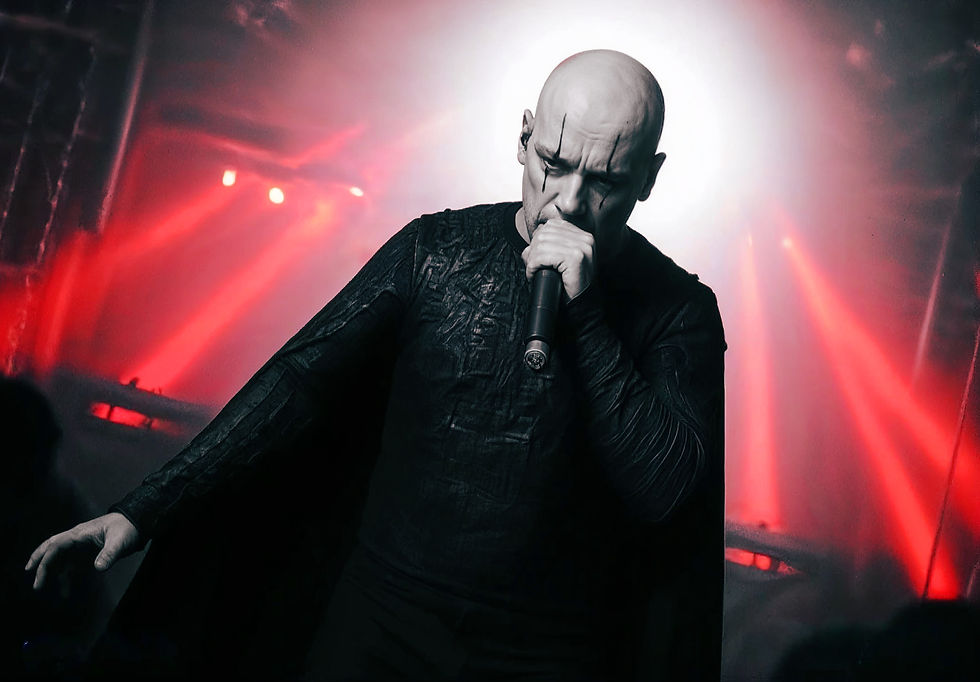
15.12 (I've lost a part of my question) / What would be your wildest dreams for Dark Line? I mean, what’s the most incredible thing you’d love to do with this project?
Drone : A total sensory live show, where images, sound, scents, and movements are synchronized. An experience that would unmoor people’s senses.
Taxidermie : A permanent exhibition-installation in an art space, where each room would immerse you in a track, a memory, a vision. And why not a film — a real immersive feature film.
16/ You’ve been based in Bordeaux for a while now. How’s the gothic and post-punk scene there? I know Primitive Destrudo organizes some gigs and DJ Algernon plays every first Friday of the month. Are there other regular events? A large audience?
Drone : It’s alive, discreet but determined. It’s not Berlin, but there are things happening.
Taxidermie : Regular events like those organized by Primitive Destrudo or DJ Algernon help keep the local scene constantly renewing itself. And some underground collectives energize the scene. The audience is present, demanding, and very engaged.
17/ Time for food! You won’t escape this question either. What are your favorite dishes, drinks, and flavors?
Drone : We love cooking together. It’s a pause where everything aligns. We chop, slice, simmer, while talking about sounds, videos, DLS. It’s often where ideas take shape or doubts clear. We also take the chance to listen to new releases or refine plans.
Taxidermie : And we love sharing those moments with friends around a good table. We love everything we shouldn’t: a rare rib steak, game from our neighbors, Basque charcuterie, strong aged cheeses, and a fine vintage wine. Those moments are as important for our creation as any studio session.

18/ What’s coming next for Dark Line Spectrum? An album just out is already a lot, of course, but what are your medium-term goals?
Drone : The album marks a transition after the departure of Mildread, a former member of DLS. We remain true to our artistic line. The album Reiteration marks the end of an era, when Mildread was still part of DLS. Today, the project has evolved, it’s different, but it remains firmly rooted in the dark, industrial, emotional identity we’ve always carried.
Taxidermie : Several tracks are already in preparation. We’re moving forward track by track, without forcing things, letting them build themselves. There will be more songs, more videos, more visions. But always the same abyssal intention.

19/ Friends, we’re already nearing the end of the interview — time flies. Is there any final message you’d like to share with the webzine’s readers?
Drone : Listen to the album in the dark. Loud.
Taxidermie : And join our Discord — the abyss awaits you.
20/ Thank you so much for taking the time to answer my questions. The final word goes to you, and I hope to see you very soon for more shared musical adventures.
See you! 😃😃
Drone : Your truth is the one that does not appear in the light.
Taxidermie : We are the abyss beyond the abyss. Thank you. See you soon in the shared darkness.
A huge thank you to Jeu d’Ombre magazine, which remains for now the only French media to have paid attention to DLS with care and respect. Their support means a lot to us.
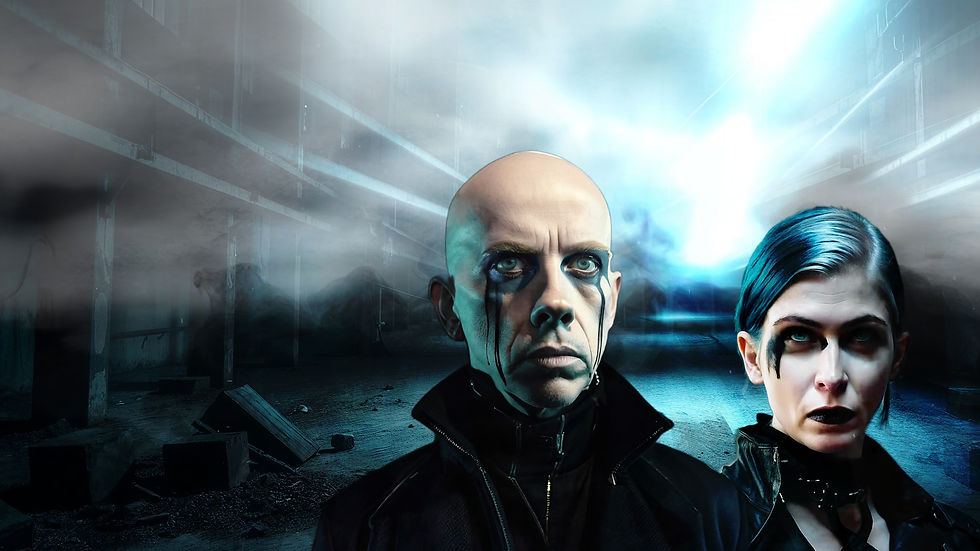


.png)
_edited_edited_.png)




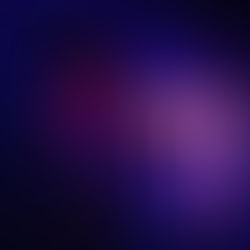



Commentaires